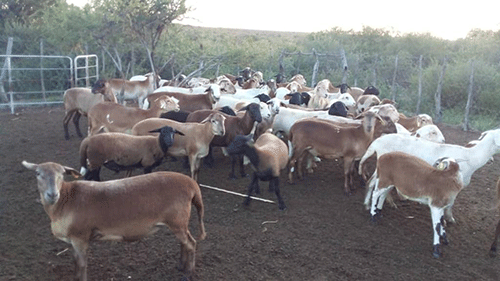Unotjari Kavari has become a household name amongst small stock breeders in Namibia, with his unique blend of sheep breeds that have kept him a step ahead of many others in the industry.
Kavari has been carrying out his farming activities at the aptly-named Orusuuo (rest) Ranch in the Eiseb area of the Omaheke region in absentia, as he has been based in Canada since 2010.
He said that has been no obstacle, and he has a farming family behind him that has been driving activities on the ground.
Unotjari said his father Steve Kavari and uncle Ace Kavari – who are both prolific stud farmers – pushed him to succeed as they keep reminding him to never give up on a dream, and to equally work hard towards it.
Kavari farms with three breeds, being Dorper, Meatmaster and Veldmaster. His first love was, however, the Dorper that he started farming with in 2015.
“I bought some Dorper sheep from Le Roux van Wyk and Dannie Visser, amongst others, that I first started with. They were all stud sheep, which allowed me to be registered as a stud breeder of the Dorper later the same year,” he explained.
Convinced that he was on a winning path, Kavari took the Dorper to Orusuuo Ranch. Unfortunately for him at the time, ‘resting’, as the name suggests, was a rather tall order as he lost a vast number of the sheep he bought to predators and poisonous plants.
“I had at a time raised the numbers of the Dorper to close to 50. But after some time, the number was reduced drastically to less than 20 due to these forces of nature. It was a bad loss, but I had to rethink the strategy and carry on,” he noted.
Kavari said he realised that the Dorper was not well-suited to the environment as it had failed to adapt to it. Although the breed won him prizes, he realised that he had to add another breed to Orusuuo Ranch to extend his ‘sheep family’. This gave birth to the acquisition of another breed – the Veldmaster.
But his name seemed to rise even higher after his 2019 introduction of the Meatmaster breed of sheep at Orusuuo Ranch. The breed has now become synonymous with Kavari’s farming activities.
He said he chose the Meatmaster, which he calls “nature’s moneymaker”, because it has better breeding values and better progeny in that it is prone to lamb twins.
“In future, I want to breed masculinity rams and femininity ewes, functional efficiency for easy lambing and covering great distances in our more arid areas,” he said.
Unlike many others who are of the opinion that only stud farming is profitable, Kavari said both stud farming and commercial farming should go hand in hand.
He said stud farming is an elaborate process that may not get you back the money you invested over a short time, while it keeps taking more from your pocket to feed the livestock and round them off.
But in the long run, it is indeed a profitable venture that has made many farmers household names due to their stud farming activities, Kavari added.
“Quantity and quality should go together. Stud farming is the way to go in the long run, but at the start, both modes of farming need each other. But when it comes to rams or bulls, don’t compromise on quality.
“Always get the best that is out there for the benefit of your herd. In my Meatmasters Stud’s thus far I used SA rams from top breeders such as Elandsnek and Collect Farming”, he said.
Kavari’s other winning recipe is to allow the animals as much time as you can to graze and browse out in nature on natural forage. He said restricting livestock to ready-mixed fodder and supplements is not only expensive, but detrimental to the animal’s growth and health in the long run.
“I have seen people who just keep their animals in small camps the whole day, and allow little foraging on their own. This is why people are afraid of stud farming because of these bad examples some people set.
“An animal is at its best health when it is allowed to feed on nature too, and that’s a fact,” he stated.
He observed that with the right attitude and conviction, farming has the potential to alleviate poverty and create wealth.



